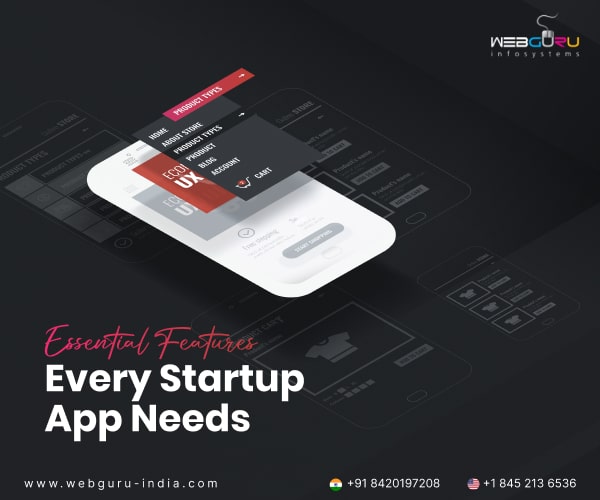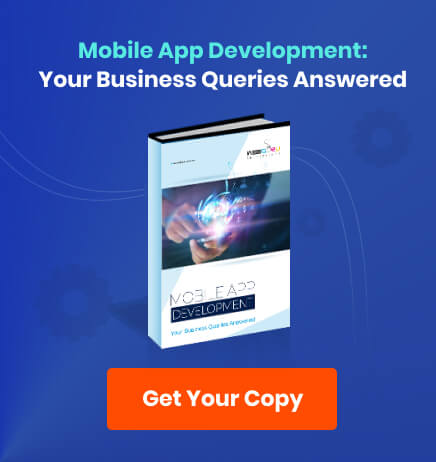Home Blog Mobile App Development Essential Mobile App Features Every Startup Needs
Essential Mobile App Features Every Startup Needs
- 18 Oct / 2025
- 615 views
- 8 Min Read

Every startup has to develop a mobile app that stands out. But knowing what features to include is very hard. Successful mobile app development services focus on core functionalities that work well in engaging and retaining users, and generating revenue. Right from simple onboarding and smart push notifications to secure payment gateways and full-blown analytics, these features make all the difference between an app that is loved and one that is simply deleted. This guide will discuss the must-have requirements, from user experience, business growth and technical scalability.
If you’re about to release your first app or make some changes in a currently existing one, knowing the attributes will make sure that the money you sink into mobile app development will yield real business results.
Mobile app development services kick off many startup journeys. Apps put your product in people’s hands. They also make or break early traction.
Today’s reality is that users spend most of their digital time inside apps. The average smartphone owner uses about 10 apps daily, and a large share of digital media time now goes to mobile apps.
Startups still struggle. Many launch apps without the features that keep users coming back. Exploding Topics states that up to 90% of startups never make it long-term, often because they miss product-market fit or fail to iterate using real user data.
Having an app isn’t enough. The right features decide whether an app drives engagement, revenue, and brand trust. This blog lists the essential mobile features startups must consider. They are grouped by user experience, business impact, and technical resilience. Let’s move to the details.
Foundation Features That Define User Experience
A smooth user experience is a baseline. If an app frustrates new users, nothing else matters. Focus on clarity, speed, and predictable flows. Minimise cognitive load. Make common tasks one or two taps. Start with how a user first meets the app.
Intuitive User Onboarding
First impressions are crucial. Users decide in minutes whether an app is worth keeping. Clear onboarding improves retention considerably. It helps new users get value fast. Components for an intuitive user onboarding include-
- Progressive disclosure (reveal features gradually)
- A clear value statement
- A skip option
Show, don’t lecture. Let users explore while offering help where needed. Good onboarding shortens the path to ‘aha’ moments. When users find value quickly, uninstall rates drop.
For example, imagine being forced to watch a long, unskippable video before using the app. Instead, imagine a step that asks one question and sets preferences, then shows a tailored home screen. This gets more positive feedback.
Seamless User Authentication
Make sure your app allows logins that keep accounts safe yet effortless to access. Offer email, phone OTP, social logins, and biometrics where possible. Each option reduces friction for different user types.
Use token-based sessions and short, clear error messages. Avoid forcing long passwords on low-risk actions. For many startups, guest access boosts trial and discovery. Let users explore core features before asking for full signup. Lower friction at signup means more users reach the first purchase, booking, or retention milestone.
Push Notifications with Smart Personalisation
Notifications bring users back. They’re one of the most cost-effective re-engagement tools. When targeted and useful, notifications lift weekly active users and session frequency. Generic notifications can be annoying. Personalisation based on behaviour, location, or preferences gets clicks and trust.
Respect timing and frequency. Let users opt in and choose categories. Test messages and send only what helps the user. For small marketing budgets, a well-timed notification can match the impact of paid campaigns.
Offline Functionality
Connectivity varies. Offline features make the app reliable and feel premium. They reduce frustration and churn. There are several types of offline features that you can use. Some examples are cached content, saved items, and queued actions.
Business-Critical Features for Startup Growth
Mobile app features must fuel both product use and business metrics. Measure, monetise, and make it easy for people to share and get help. Start with the data that drives decisions.
In-App Analytics and User Tracking
Make sure there are in-app analytics. Instrument the app to capture behaviour and funnels. You can’t guess where to invest. But the data will show you exactly what users actually do. This keeps iteration focused and cost-effective.
Track retention cohorts, session duration, conversion funnels, feature usage, and crash rates. Plug in analytics platforms like Google Analytics or Mixpanel to get actionable dashboards. Use metrics to prioritise features, run A/B tests, and decide when to pivot.
Multi-Payment Gateway Integration
Reliable payments equal revenue. Offer multiple gateways to cover regions and user preferences. More payment options reduce checkout drop-offs. Stripe, PayPal, and Razorpay are some of the popular options. You can go for local providers too.
Choose gateways that match your geography and fees. Follow PCI rules and use tokenisation. Security builds trust and prevents costly breaches. Flexible payments cut friction and lower abandonment at checkout.
Social Sharing and Viral Features
You must also make sure that your app has built-in sharing, referral links, and social hooks. Organic sharing brings users for free, and referrals convert better than cold channels. A simple referral flow can be a growth engine. Add incentives where appropriate. Share content and achievements.
Customer Support Integration
Customer support includes in-app chat, help centres, bot-assisted triage, and FAQs. New brands win trust by being available and helpful. Chatbots can help with basic queries, and humans with complex issues. Start with a lightweight helpdesk. Increase support as volume grows.
Technical Features That Ensure Scalability and Security
Choose technical foundations that scale without doubling costs. Some examples of these are cloud, APIs, and strong security. These let you grow fast and safely. Begin with the backend.
Cloud-Based Backend Infrastructure
Host app logic and data in cloud services rather than single servers. Cloud scales with user growth. This way, you can avoid major re-engineering when demand spikes. There are cost benefits too. Pay-as-you-go reduces upfront capital. You only pay for what you use.
The maintenance is also automatic. Managed services handle updates, backups, and failover. Some popular solutions include AWS, Firebase, and Azure. Pick what matches your stack and team.
API Integration Capabilities
APIs let you add payments, maps, analytics, and more without rebuilding. It is a design that accepts third-party services. You can integrate payment gateways, CRM systems, email marketing tools, or AI services. A modular API approach lets you swap services as costs or needs change.
Robust Security Features
Trust is fragile for new brands. A breach can destroy your brand reputation overnight. Encrypt data in transit and at rest. Use secure authentication, regular patches, and least-privilege access.
Follow relevant regulations like GDPR and local data laws. Conduct regular audits. Schedule security reviews and dependency scans. Beyond fines, breaches cost users and can halt growth.
From Feature List to Market Success
Building every feature isn’t the point. Choose features that aid your users’ immediate needs and your business goals. Rank these features by impact and effort. Use analytics to validate priorities.
An experienced mobile app development company helps you avoid costly technical debt and pick pragmatic solutions. They can guide trade-offs and keep timelines tight.
With over 19 years of experience, at WebGuru Infosystems we offer focused mobile app development services and build apps across industry verticals. If you want a partner that can scope features, ship quickly, and support scaling, this history matters.
If you have an app idea or an existing product, audit it against this checklist. Mark mandatory, nice-to-have, and experimental features.
Ready to build a mobile app that drives real business results? Let’s discuss which features will make the biggest impact for your startup. If you want hands-on help, a reputable mobile app development company or team that provides full application development services and delivers an MVP. Contact us at WebGuru Infosystems today to get started.

Srishti Bhattacharyya
A writer driven by a love for words, who is constantly exploring new ways to push the boundaries of expression. Always testing the limits of creativity, she finds inspiration in books, painting, and the endless ideas waiting on Pinterest.

-
1000+
Happy
Clients -
25+
Countries
Served -
20+
Years of
Trust







